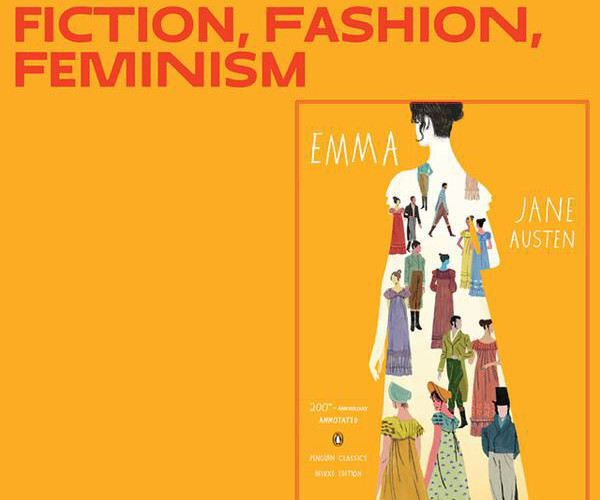
by Hilary Ilkay
In case you missed our big symposium on Emma at 200: Fiction, Fashion, Feminism, in the fall of 2015, the video links are now live! As the Literary Studies Graduate Student Assistant, I had the pleasure of helping out behind the scenes for the symposium. It was an absolute treat to meet all of the speakers and moderators in person and hear their insightful, engaging talks. What struck me most was the diversity of the backgrounds and interests of the presenters; every panel brought Jane Austen’s novel to life in new and often unexpected ways. Here’s a quick summary of the day’s proceedings, either to refresh your memory or to give you a sense of what you should check out in the video archive!
Juliette Wells kicked off the day with an enlivening discussion of various editions of Emma, stating that “a book’s binding is its dress and its mirror” and tracing the convergence between fashion, fiction, and feminism in printing and bookbinding culture. On the subject of the marriage plot, Talia Schaffer contrasted Mrs. Elton’s pragmatic approach to social networking with Emma’s desire for removal from such a commodified world, while Elsie B. Michie used Adam Smith’s Theory of Moral Sentiments to frame her consideration of the roles of the “impartial spectator,” envy, and self-approbation in the novel.
After a lunch break, Mary Jean Corbett traced Virginia Woolf’s complex relationship to Jane Austen. Woolf praised Austen’s work and yet derided comparisons to Austen in reviews of her own novels. Gina Walker and Ellen Rooney offered reflections on the subject of feminist style: Walker speculated on the possible causal link between Mary Hays’s semi-autobiographical character in Memoirs of Emma Courtney and Austen’s own Emma, considering what this connection might reveal about the conceptions of feminism developed by both writers, while Rooney canvassed the implications of reading Austen’s “voice” across characters in the novel.
The final panel of the day featured three very different talks: Timothy Campbell, with wonderful visual aids, showed how fashion cycles would have influenced Austen’s literary imagination; Elizabeth Kendall movingly paid tribute to the craft and architecture of Emma; and Elaine Savory delivered a fascinating talk about what it means to read Emma in the world of social media and dating apps like Tinder.
I was surprised and delighted by the strong sense of support and openness in the room, and especially by the camaraderie amongst all of the speakers. Coming from a Classics background, I learned so much about Emma and Austen’s world, and I look forward to delving into the beautifully designed bicentennial edition produced by Penguin with a deeper appreciation for – and understanding of – the text.